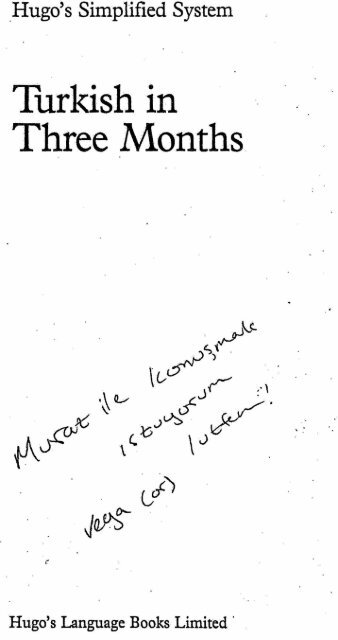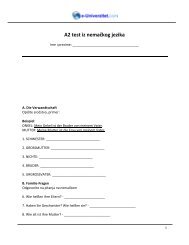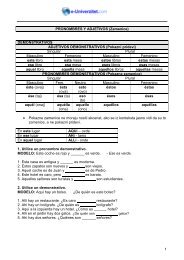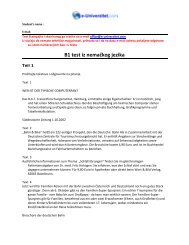Turkish in three month.pdf - Centar za edukaciju
Turkish in three month.pdf - Centar za edukaciju
Turkish in three month.pdf - Centar za edukaciju
Create successful ePaper yourself
Turn your PDF publications into a flip-book with our unique Google optimized e-Paper software.
,Hugo's Simplified System<br />
<strong>Turkish</strong> <strong>in</strong><br />
Three Months<br />
Hugo's Language Books Limited'<br />
"
© 1989 Hugo's Language Books Ltd<br />
All rights reserved<br />
ISBN 0 85285 136 7<br />
Written by<br />
Bengisu Rona BA (Istanbul), PhD (London)<br />
Lecturer <strong>in</strong> <strong>Turkish</strong> Studies<br />
School ofOriental & Mrican Studies<br />
University ofLondon<br />
Set <strong>in</strong> 10/12 Plant<strong>in</strong> by<br />
Typesetters Limited<br />
16, Mead Bus<strong>in</strong>ess Centre, Mead Lane. Hertford<br />
Pr<strong>in</strong>ted and bound <strong>in</strong> Great Brita<strong>in</strong><br />
by Courier International Ltd,<br />
Tiptree, Essex
6<br />
Lesson 14 145<br />
Object participles<br />
-DiK + possessive: past/present<br />
object participle<br />
-(Y)ECEK + possessive: future<br />
participle .<br />
Object participles from possessives<br />
'when' with object participles<br />
Object participles as nouns<br />
Indirect speech<br />
whether ... or not<br />
Comb<strong>in</strong>ations with -DiKl<br />
-(Y)ECEK + possessive<br />
Lesson 15 159<br />
-(y)EBiL: can, to be able to, may<br />
-(Y)EME: cannot, unable to<br />
-MEYEBiL: may not<br />
Countries, languages, people<br />
Uses of-CE<br />
Lesson 16 164<br />
The conditional: -SE<br />
lSE/-(Y)SE: conditional of'to be'<br />
. Some derivational su.fflXes<br />
Lesson 17 171<br />
The passive<br />
The reflexive<br />
The reflexive pronoun<br />
Lesson 18 177<br />
The causative<br />
Uses ofthe causative<br />
The reciprocal<br />
The reciprocal pronoun .<br />
Key 184<br />
Answers to exercises<br />
Translations<br />
M<strong>in</strong>i-dictionary<br />
Index 204<br />
196
a back vowel: a rather than e.<br />
This feature is called vowel harmony. It is basically a str<strong>in</strong>g<strong>in</strong>g together<br />
ofvowels ofsimilar quality, so that there is a sound harmony extend<strong>in</strong>g<br />
over the whole word. Vowel harmony operates on two qualities of the<br />
vowels: whether they are back or front and whether they are round or<br />
non-round.<br />
Back and fronc 'Vowels<br />
<strong>Turkish</strong> has eight vowels. Four ofthem are front vowels: e, i, 0, ii.<br />
These front vowels are produced with the tongue forward <strong>in</strong> the mouth:<br />
the middle-to-front portion ofthe tongue is raised towards the front of<br />
the roof ofthe mouth (although it does not touch the roof ofthe<br />
mouth).<br />
The other four are back yowels: a, 1, 0, u. The back vowels are<br />
produced with the front part ofthe tongue held low <strong>in</strong> the front ofthe<br />
mouth, while the back part ofthe tongue is raised towards the back of<br />
the roof ofthe mouth. When you make these sounds, it feels rather as if<br />
the front vowels are produced <strong>in</strong> the front ofthe mouth, and as ifthe<br />
back vowels are produced <strong>in</strong> the back ofthe mouth.<br />
Ifthe last vowel ofthe base (the ma<strong>in</strong> part) ofthe word is a front vowel,<br />
then the vowel <strong>in</strong> a SuffIX addeg to it will also be front z the vowel <strong>in</strong><br />
each subsequent SuffIX be<strong>in</strong>g governed by the vowel ofthe syllable that<br />
precedes it: .<br />
!l hand. ell!r!nd! <strong>in</strong> his hands<br />
But ifthe last vowel ofthe base is a back vowel, then the vowel <strong>in</strong> the<br />
suffix which follows it wi1J also be back. and the vowel <strong>in</strong> each<br />
subsequent SUffIX will aga<strong>in</strong> be determ<strong>in</strong>ed by the vowel preced<strong>in</strong>g it:<br />
oda room odalarlmlZdan from our rooms<br />
- - - -<br />
There are some suffIXes which are non-harmonic - that is, they always<br />
have the same vowel, regardless ofthe vowel <strong>in</strong> the preced<strong>in</strong>g syllable.<br />
Round and non-round 'Vowels<br />
The same eight vowels can also be grouped differently as round and<br />
nOll-round vowels. The round vowels are those we say with the lips<br />
rounded and slightly fonvard: 0, 0, u, ii. The other four vowels are nonround:<br />
a, e, I, i.<br />
11
86<br />
3 We have been stay<strong>in</strong>g (are stay<strong>in</strong>g) <strong>in</strong> this hotel s<strong>in</strong>ce last Sunday.<br />
4 I walked as far as the hotel.<br />
5 What did you do after the meal?<br />
71 Forms of address<br />
In address<strong>in</strong>g people formally <strong>in</strong> <strong>Turkish</strong>, the words bey Igentleman'<br />
and hanlm 'lady' are used with the first names:<br />
Gi<strong>in</strong>aydln Abmet Bey. Good morn<strong>in</strong>g, Ahmet Bey.<br />
Naslls1nlZ Ay§e Hanl<strong>in</strong>? How are you, Ane Hamrn?<br />
Ifsurnames are used, then the words Bay lMr' or Bayan 'Mrs/Miss'<br />
precede the surname (and the first name, ifone is given) as <strong>in</strong> English:<br />
Bay Ahmet Atakan or Bay Atakan<br />
Bayan Ay§e Kudu or Bayan Kudu·<br />
Another form ofaddress where surnames are used is Sayln lesteemed':<br />
it is formal, <strong>in</strong>dicat<strong>in</strong>g respect, and is used for both men and women <strong>in</strong><br />
the same way. It can also be used with titles:<br />
Sayln Profesor Ek<strong>in</strong> orada mt? Is Professor Ek<strong>in</strong> there?<br />
SaYln Ay§e Kudu biraz sonra geUyor. Mrs Ay§e KutIu will be here<br />
a little later (Le. is com<strong>in</strong>g).<br />
SaYln Ba§bakan gelecek ay Amerika'ya gidiyor. The Prime<br />
M<strong>in</strong>ister is go<strong>in</strong>g to America next <strong>month</strong>.<br />
As all these forms of address <strong>in</strong>dicate a certa<strong>in</strong> degree offormality, the<br />
personal SuffIX to be used with them is ofcourse second person plural:<br />
SaYln Atakan, bu kitabl istiyor musunuz?<br />
You can address an envelope:<br />
Sayln Ahmet Atakan<br />
or Bay Ahmet Atakan<br />
or SaYln Bay Ahmet Atakan<br />
but <strong>in</strong>side, beg<strong>in</strong> the letter:<br />
SaYln Atakan (official letters)<br />
SaYln Miidiir/Doktor/etc.<br />
Ahmet Bey/Ay§e Hanlm (still formal, but less official, more personal)<br />
The direct translation ofthe word 'dear' is sevgili, but <strong>in</strong> <strong>Turkish</strong> this
88<br />
Exercise 19<br />
Translate the follow<strong>in</strong>g:<br />
1 We are on holiday until September.<br />
2 I lost my ticket before the plane took ofT, but later I found (it).<br />
3 We opened all the w<strong>in</strong>dows before smok<strong>in</strong>g.<br />
4 Last night, after you left, I telephoned London.
Lesson 14<br />
124 Object participles<br />
In lesson 13, we said that object participles are used where two<br />
sentences to be l<strong>in</strong>ked have different subjects, as <strong>in</strong> the English<br />
sentences:<br />
The police (subject) caught the man.<br />
The man (subject) was not a thief.<br />
The man whom the police caught was not a thief.<br />
In this comb<strong>in</strong>ed sentence, the recurrent element (the noun which<br />
occurred <strong>in</strong> both of the simple sentences that were jo<strong>in</strong>ed) 'the man' is<br />
the subject ofthe ma<strong>in</strong> verb (was) and the object ofthe verb <strong>in</strong> the<br />
relative clause (caught).<br />
In such cases an object participle is used <strong>in</strong> <strong>Turkish</strong> to jo<strong>in</strong> the two<br />
sentences, because the recurrent element is the object ofthe sentence<br />
that becomes the clause. In fact, the object participles are also used <strong>in</strong><br />
<strong>Turkish</strong> when the recurrent element is not the direct object ofthe<br />
subord<strong>in</strong>ate clause, and when English uses another relative pronoun like<br />
'where' or 'to whom':<br />
The house where they live is too small.<br />
The man I gave the book to has gone. (The man to whom I gave the<br />
book has gone.)<br />
There are two participles which function <strong>in</strong> this manner <strong>in</strong> <strong>Turkish</strong>,<br />
and they are bot_h followed by the possessive suffix. The possessive<br />
suffIX <strong>in</strong> this case <strong>in</strong>dicates the doer ofthe action, that is to say the<br />
subject ofthe participle. The literal mean<strong>in</strong>g ofthe <strong>Turkish</strong> versions of<br />
the two sentences above will thus be:<br />
The their-liv<strong>in</strong>g-house is too small.<br />
The the-book-my-hav<strong>in</strong>g-given man has gone.<br />
145
170<br />
gidebiliriz, ama bunu ben oraya gel<strong>in</strong>ce konu§uruz. Bu mektup .;:ok klsa<br />
oldu, ancak programlml sana hemen haber vermek istedim. <strong>in</strong>§allah<br />
yakmda bol bol gorU§uriiz.<br />
Sevgiler,<br />
<strong>in</strong>ci
1<br />
1<br />
1<br />
1<br />
1<br />
1<br />
1<br />
1<br />
1<br />
1<br />
1<br />
1<br />
1<br />
1<br />
1<br />
1<br />
1<br />
1<br />
1<br />
1<br />
1









